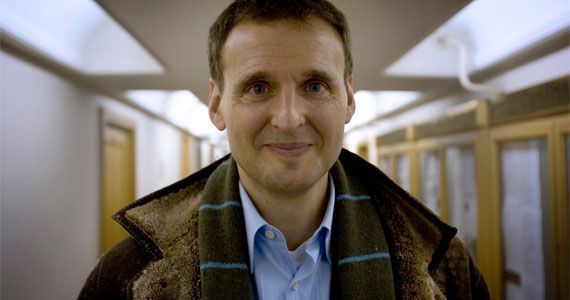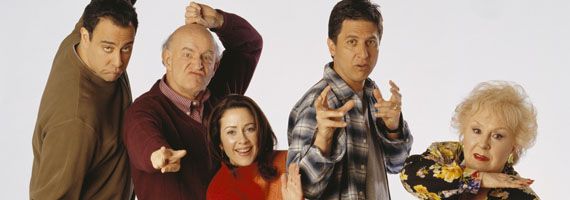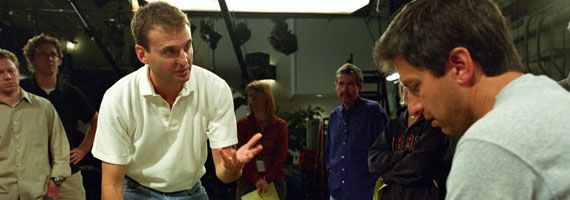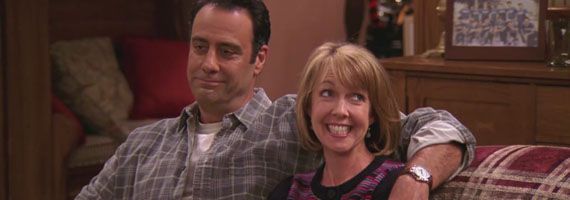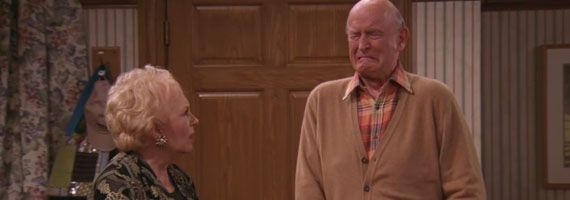Tonight at 8pm, HBO will premiere the hilariously revealing documentary Exporting Raymond, which documents Everybody Loves Raymond creator Phil Rosenthal's attempt at adapting his Emmy Award-winning series for Russian television.
Wrapped in the comically terrifying tropes of the former Soviet Union, Rosenthal's entertaining journey into the Russian television industry reveals that while American television may be working with a bigger budget, the process of developing a television series in another country is extremely similar - and just as challenging.
For television fans, Exporting Raymond gives a look behind the scenes of what it takes to actually bring a television series to air. And even though some elements may appear hilariously absurd in the Russian setting (the not-so-funny Russian comedy executive that was formerly a laser expert), the American television industry has its equivalent (including laser-experts-turned-comedy-executives).
Since Exporting Raymond presents the challenges that Rosenthal had to overcome while attempting to adapt Everybody Loves Raymond in Russia, we wanted to find out what he went through in order to bring Everybody Loves Raymond to air in America.
From the initial pilot, to becoming a series, to dealing with the network, to quitting the show (twice), Rosenthal gives an extremely revealing look at what it took to make Everybody Loves Raymond a hit for CBS.
Below is Rosenthal's responses to our questions, combined into one fluid experience in the television industry:
Network Executives: They're The Same In Any Country
[In 'Exporting Raymond'] you hear me say "Oh, those Russians!" – but it's not those Russians, it's those executives; it's the same everywhere. The same "No, you can't do that" is the same in every country.
I run into just as many heads of comedy in America who don't have a funny bone in their body.
Dealing With "The Powers That Be" - Without Getting Fired
You learn to be diplomatic. Not just in Russia, obviously – in America, too.
They all have a job to do, and they're trying to do it to the best of their ability. Nobody is trying to... [Well,] with a few exceptions, there are some saboteurs out there sometimes. But, with very few exceptions, people mean well.
And it doesn't do you any good to say "I'm not doing that! You're an asshole, and I'm always right – and you don't know anything!" That doesn't help anybody, [if you] do that. In fact, just for purely self-interest reasons, you're hurting yourself by doing that, because that person won't like you and they won't want to do business with you, and they'll hope that you get canceled with that attitude.
Network Notes: How To Say "No"
What I always say is – and I mean it when I say it - "I'll take a look at that," and I really will. If someone gives me a note - no matter who it is - it actually could be to my benefit to consider it, because great ideas can come from anywhere.
And I don't think that I'm smart enough to think that I have all the great ideas, so it pays to listen. So sometimes shut up and listen, because maybe someone else could have an idea that you could benefit from.
BUT THEN, because it is my show, and because the show needs to be from my point of view, I then decide whether that idea is valid: whether it works or whether it doesn't. And then I have to decide what to do – and that's my decision, whether to take the note or not.
Now, they may be angry because I didn't take that idea – but I have reasons why I didn't; I can explain that to them. Sometimes that's not good enough; sometimes you could get fired for that attitude.
But that's the chance you have to take, because the road is littered with many, many shows where the showrunner took everybody's ideas – regardless if they were good or not. Because they thought that by taking everybody's idea then that would make the show bulletproof – but in fact, it makes the show riddled with bullets. And then the show died!
When To Quit The Show You Created
I quit ['Everybody Loves Raymond'] twice before it made it to air. You don't quit over "I don't like this craft service, so I quit" – that's stupid.
But you do quit over the big things, if you have to - [For instance,] them telling you who you're going to cast in your show. And for me, that was a deal breaker. They were suggesting someone to play Raymond's wife that I just couldn't live with, and so I was quitting over that.
I got to the point where I couldn't live with that decision. I tried to reason with them, but I then thought of a creative way to get what I wanted and what I needed [for the show]. And I did it without insulting people – they knew that I just couldn't live with it.
I don't know if I called their bluff or whatever, but I wasn't trying to – and I wasn't bluffing. But sometimes, if you say that you're going to actually quit, it's the strongest move you can make in the situation.
And that shows a kind of conviction that they secretly like – that actually makes you look better to them. For a second, they go, "Wait a minute. He feels so strongly about this point that he's willing to leave his job over it? Maybe he knows something we don't OR maybe that's the kind of conviction that makes a television show good."
But you do get their attention [from quitting]. Now I wasn't trying to do that - this is all in hindsight that I'm saying this – but it did work twice for me.
The second time I quit was after we got picked up to series, after the pilot was made.
-
More on the Raymond experience...
From Pilot To Series: The Creation Of A Multi-Million Dollar Business
They said, "Who is going to run the show?" and I said, "I assumed me – because I made the pilot, yes? And you liked the pilot enough to pick it up to series, yes? So if it's all good, we'll just do more of that!"
They said, "No, no… You don't understand; you've never run a show before. Why would we entrust this…", now it's a multi-million dollar business, "…why would we entrust this to you?"
And I said, "Well, because I'm writing about my family – and nobody knows my family like I do." Now that's not bullshit, that's true! Now I couldn't pull this with any other show, because no other show was about my family – but this one was!
So I said, "If you have somebody else run the show… I'm not going to work for somebody else on my show - it doesn't make sense. And the show will stink, because the person doesn't know what I know – and I'm not going to do it."
And they said, "Okay, goodbye!" – and for three days I sat there thinking that I just gave up my show. I created a show for them, they were now giving it to someone else to run, and I was out. So for three days, that's what I thought.
…and then they called back and said that they're going to let me run the show.
Writing A Hit Show: It's Difficult
Writing is very difficult – so it's a lot like homework. I spent a lot of my teen years trying to avoid homework. In fact, I spent most of my childhood avoiding homework. So, it's a bit ironic that my job now is basically homework.
People will say, "Yeah, but you're a writer." Yeah, but that doesn't mean I like it. You know, I'm sure there's a lot of construction workers who aren't all that crazy about construction.
So I do it because I've been told that I'm okay at it – and I keep doing it because people keep paying me to do it. I don't know if I would do it otherwise.
I do love [writing] once I'm in to it, and I especially love it after I'm finished with it.
The act of sitting down and trying to think up something that someone else might like? That is terrible; it's hard. In fact, I'd rather do construction.
Celebrating A Series: Success Is A Miracle
I recognized it as it was happening – and I felt that very thing as it was happening: "I'll never have this again!"
To have any success at all, to me, was a miracle. I mean, just to get on the air, to me, was a miracle. Then to last [one] season was a miracle. Then to last more than [one] season was a miracle. Then to have it be as successful as it ultimately became and the fact that it's still on television – it's like hitting the jackpot over and over and over again.
There's nothing in life that compares to this – and never will! And I knew it at the time!
[Editor's note: Over the course of 9 years, Everybody Loves Raymond averaged 15.5 million viewers for each of its 210 episodes - and that's including its first season premiering in television's dreaded Friday night death slot. On top of ratings success, Everybody Loves Raymond also went on to be nominated for 129 awards, winning 49 - including 15 Emmy Awards.]
After Its Over: Diversify
You know, mainly because business is so terrible, I, like many, have had to diversify. So, I'm not looking for that exact kind of success again – I don't think it's possible.
Nor would I be interested in doing that again, because I did it! I did it for nine years, so I exhausted those resources – meaning that type of family sitcom.
So now, I'm writing a Broadway musical, for example; I'm working on an animated show; I'm working on a different type of sitcom – I'm even working on a food reality show, because I love to eat.
So there are all these things… I have two screenplays out there, based on two stories from my book, that I've written and am going to direct – and just raising money for those things, it's like I was never in the business.
The Status Of Television: Most Things Are Terrible, Not Just On TV
I think there's always been mostly terrible stuff. Not just in TV, but in movies, in theater, in art. [I mean,] how many people do you really like? Most things are terrible – and there's always been a few great things at any given time.
I don't think there's ever been a "Golden Age," right? We could be in the "Golden Age" right now – I don't know. But I do know that the ratio of "great to terrible" has always been huge – mostly on the side of "not so good."
Has it changed? Yes, it's changed. The kind of show that we were trying to do a few years ago... I don't know if ['Everybody Loves Raymond'] would get on the air today - but that's not to say that there aren't great shows of a different kind on the air today. Even shows [that are similar to 'Everybody Loves Raymond']; there's at least one: 'Modern Family' – that's very close.
For anyone that is interested in what it actually takes to create a television series (or if you simply want to laugh at Rosenthal having to buy K&R insurance (kidnap and ransom)), check out Exporting Raymond, as well Phil Rosenthal's book You're Lucky You're Funny: How Life Becomes a Sitcom, both of which give an even more hilarious and in-depth, behind-the-scenes look at the television industry.
-
Exporting Raymond airs tonight @8pm on HBO
Follow Anthony on Twitter @anthonyocasio

